Israeli troops that pulled out of southern Gaza today did so to prepare for future operations, including in the enclave's southern city of Rafah, Israeli defence minister Yoav Gallant has said.
"The forces are exiting and preparing for their next missions, we saw examples of such missions in the Shifa operation, and also of their coming mission in the Rafah area," Mr Gallant said at a meeting with military officials, according to a statement from his office.
Israel withdrew soldiers from southern Gaza today, leaving just one brigade.
The White House meanwhile, said Israel's partial withdrawal from southern Gaza is likely so its troops can "rest and refit," rather than a move towards a new operation.
"They've been on the ground for four months, the word we're getting is they're tired, they need to be refit," National Security Council spokesman John Kirby told ABC's "This Week," though he stressed that it was "hard to know exactly what this tells us right now".
Mr Kirby spoke hours after Israel, which has been under increasing pressure from Washington over the conflict's spiraling death toll, pulled all its troops out of southern Gaza, including from the city of Khan Younis, according to the military and Israeli media.
The Israeli Defence Forces (IDF) said a "significant force" will continue to operate in the rest of Gaza, which it invaded after a 7 October attack by Palestinian militant group Hamas.
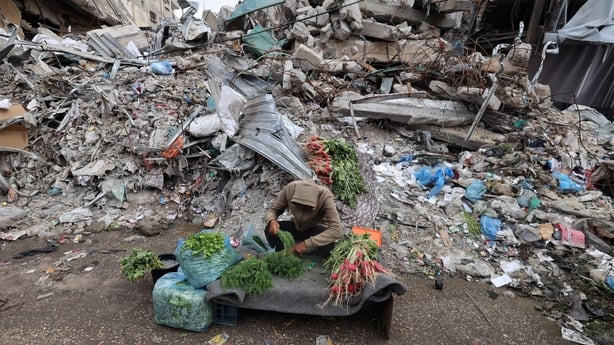
Mr Kirby said he would let the IDF "speak to their operations."
"As we understand it, and through their public announcements, it is really just about rest and refit for these troops that have been on the ground for four months and not necessarily, that we can tell, indicative of some coming new operation for these troops," he said.
It remains unclear whether the withdrawal would delay a long-threatened incursion into the southern Gaza city of Rafah, which Israeli leaders have said is needed to eliminate Hamas.
It comes as Egypt prepares to host a new round of talks aimed at reaching a ceasefire and hostage release deal.
Israel's offensive in Gaza, launched after the attack by Hamas on Israel six months ago on 7 October has focused in the past months on the south of the Palestinian enclave.
Rafah has become the last refuge for more than a million Palestinians sheltering in the territory near the border with Egypt.
An Israeli brigade is typically made up of a few thousand troops.
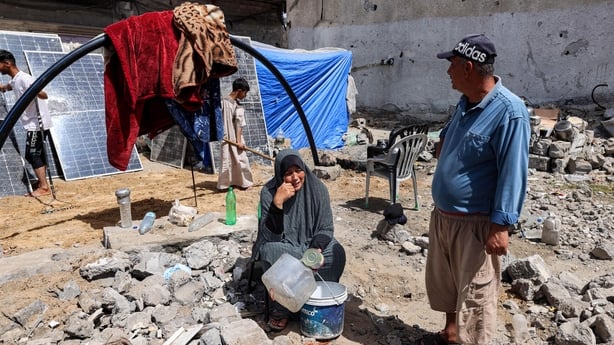
The Israel-Hamas war that has devastated Gaza entered its seventh month today, with talks towards a truce and hostage release deal expected to resume in Egypt.
Months of stop-start ceasefire talks have made no headway since a week-long truce in November saw some hostages exchanged for Palestinian prisoners detained by Israel.
In a new push in Cairo, CIA Director Bill Burns and Qatari Prime Minister Sheikh Mohammed bin Abdulrahman bin Jassim Al-Thani will join Egyptian officials for indirect talks from today between the Israeli and Hamas delegations, Egypt's Al-Qahera News said.
Hamas has confirmed that its core demands are a complete ceasefire and the withdrawal of Israeli forces - conditions Israel has previously rejected.
The US blames the failure so far on Hamas' refusal to release sick and other vulnerable hostages, while Qatar has said Israeli objections to the return of displaced Gazans are the main obstacle.
Mr Biden wrote to Egypt and Qatar's leader ahead of the talks urging them to secure commitments from Hamas to "agree to and abide by a deal", a senior administration official told AFP.
International backlash
As the bloodiest ever Gaza war passed the half-year mark, Israel's government has faced a growing international backlash against its military campaign, and mass street protests at home.
Relations with top ally the United States have deteriorated, and the Middle East is on edge over a potential response from Hamas' ally Iran to a deadly strike on Tehran's consulate building in Syria last week that was widely blamed on Israel.
Israel has faced a storm of international outrage over the killing of seven aid workers of the US-based food charity World Central Kitchen in a Gaza airstrike on 1 April.
US President Joe Biden, in a terse phone call with Israel's Prime Minister Benjamin Netanyahu on Thursday, demanded vastly greater aid deliveries into the territory now threatened by famine.
We need your consent to load this rte-player contentWe use rte-player to manage extra content that can set cookies on your device and collect data about your activity. Please review their details and accept them to load the content.Manage Preferences
Mr Biden also urged an "immediate ceasefire" and hinted at making US support for Israel conditional on curtailing the killing of civilians and improving humanitarian conditions.
UK Prime Minister Rishi Sunak also demanded that "this terrible conflict must end".
"We continue to stand by Israel's right to defeat the threat from Hamas terrorists and defend their security," Mr Sunak said. "But the whole of the UK is shocked by the bloodshed."
A Palestinian father-of-six in northern Gaza, Muhammad Yunis, 51, told AFP the territory's 2.4 million people desperately need a reprieve from the bombardment and suffering.
"It's been half a year and the bombing and starvation continue," said the man from Beit Lahia, now a broken landscape of shattered buildings.
"Watching the thin bodies of our children takes away our souls ... I feel helpless and humiliated," he said.
"Isn't the bombing, death and destruction enough? There are bodies still under the rubble. We can smell the stench."
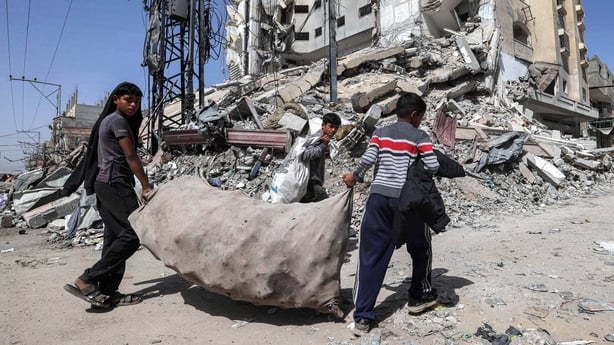
Hospital an 'empty shell'
The war broke out on 7 October with an unprecedented attack from Gaza by Hamas militants that resulted in the deaths of 1,170 people, mostly civilians, according to Israeli figures.
Hamas and Islamic Jihad militants also took more than 250 hostages, and 129 remain in Gaza, including 34 who the army said are dead.
Israel's retaliatory offensive has killed at least 33,137 people in Gaza, mostly women and children, according to the health ministry in Gaza.
The Israeli military said today another four of its troops had been killed in Gaza, bringing the toll to 260 since it launched ground operations in late October.
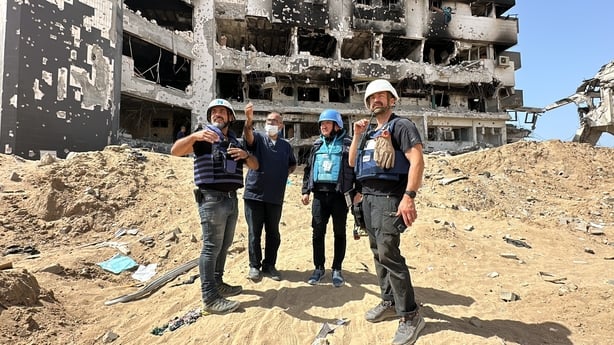
Vast areas of Gaza have been turned into a rubble-strewn wasteland and its people have been trapped in a dire humanitarian crisis amid an Israeli siege.
Gaza has received only sporadic aid via a road crossing with Egypt, airdrops and two sea shipments - but aid agencies warn the deliveries fall far short of the dire needs.
Under US pressure, Israel has pledged to allow for the first-time aid deliveries through its Erez border crossing with northern Gaza.
After months of war, most of Gaza's hospitals are out of action and the largest, Al Shifa hospital in Gaza city, lies largely in ruins.
After fierce battles there, Al-Shifa is "now an empty shell with human graves", said World Health Organization head Tedros Adhanom Ghebreyesus.
Mass protests
Mr Netanyahu has come under intense pressure at home from families and supporters of hostages, and from a resurgent anti-government protest movement.
Ten of thousands rallied in Tel Aviv and other cities yesterday, demanding "elections now".
Among the protesters was Israel's centrist opposition leader Yair Lapid, who was later headed to Washington, his Yesh Atid party said.
Mr Lapid was expected to meet US Secretary of State Antony Blinken and National Security Advisor Jake Sullivan.
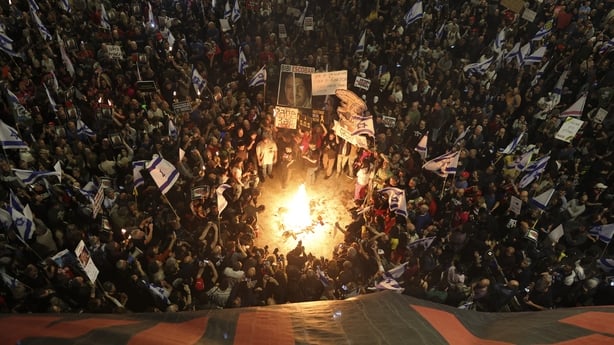
He will also meet Senate Majority Leader Chuck Schumer, who last month called for a snap Israeli election to give voters a chance to get rid of Mr Netanyahu.
Fears that the war could spread have intensified after Iran vowed to hit back for the killing of seven of its Revolutionary Guards in an airstrike on Monday on the consular annex of its embassy in Damascus.
Iran's leaders have pledged retaliation, and the leader Lebanon's Iran-backed Hezbollah movement, Hassan Nasrallah, has called the consulate strike a "turning point".
Israel's military said today its warplanes had struck Hezbollah sites in eastern Lebanon's Baalbek region, where the group has a strong presence, in retaliation for one of its drones being downed.

